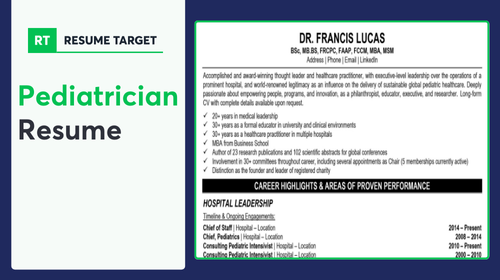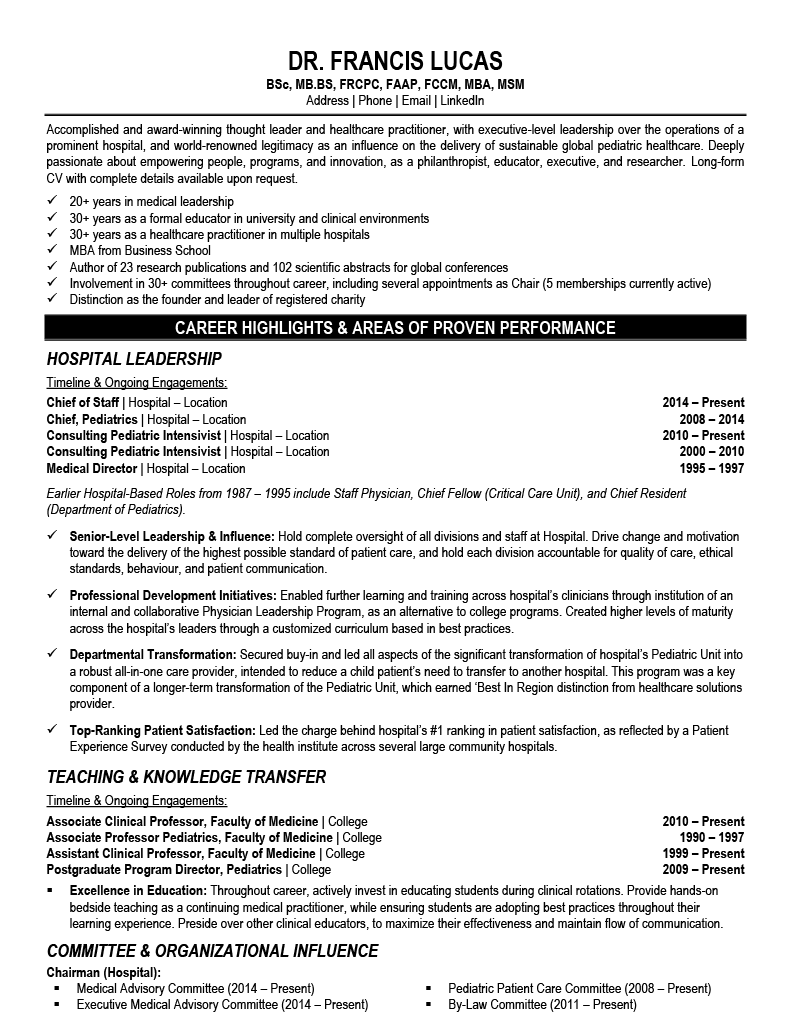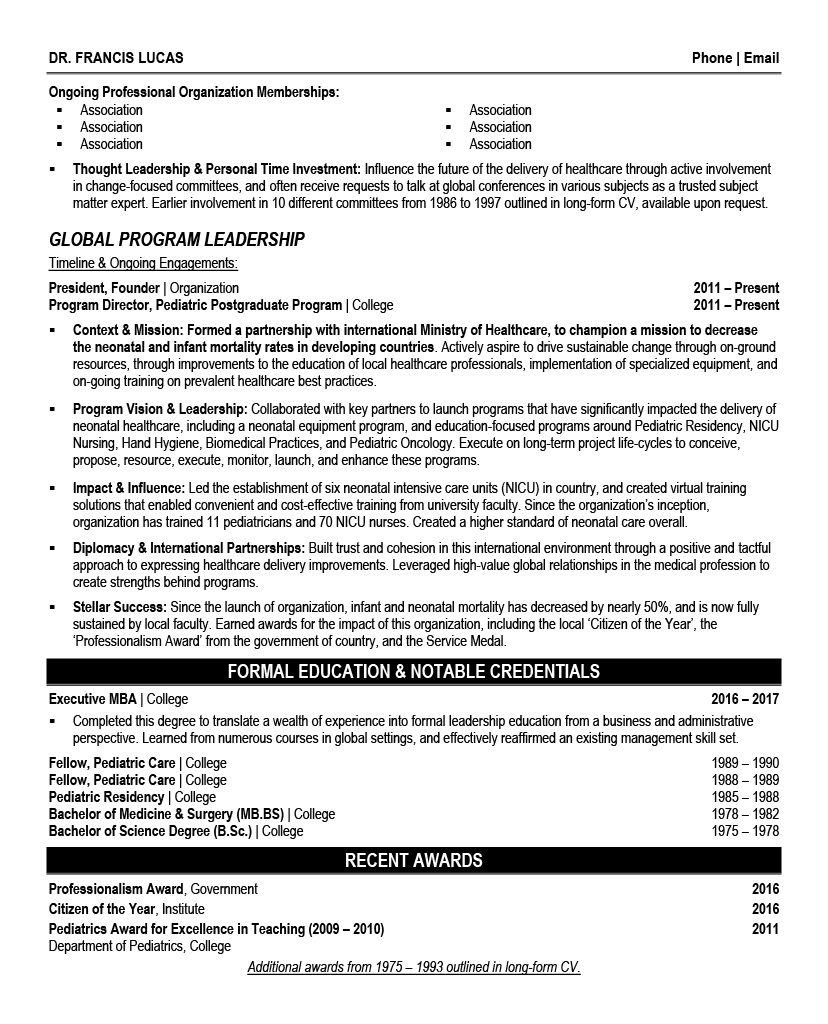

Translating years of medical training and countless patient success stories into a compelling resume can feel overwhelming. Your expertise in children's health deserves more than just a list of credentials and clinical duties.
Are you struggling to make your pediatric experience stand out from other qualified candidates? A strategically crafted resume can showcase both your medical expertise and your unique approach to caring for young patients and their families.
Resume Target specializes in helping pediatricians transform complex medical careers into powerful job-winning documents. We'll help you create a resume that speaks directly to hiring managers and gets you into the interview room where you can truly shine.


As champions of children's health, pediatricians play a crucial role in reducing infant and child mortality while fostering the healthy development of our youngest generation from birth through adolescence.
Your work as a pediatrician involves conducting comprehensive wellness checkups, administering vital vaccinations, diagnosing childhood illnesses, and building trusted relationships with families who rely on your expertise to guide their children's health journey.
Whether you're drawn to general pediatric practice or specialized fields like pediatric cardiology or neurology, the path to becoming a pediatrician offers diverse opportunities to make a lasting impact on children's lives while advancing your medical expertise in this rewarding field.
Let's talk about the exciting earning potential in pediatric medicine! Your career as a pediatrician opens doors to impressive compensation packages that reflect your dedication to children's healthcare. And guess what? The rewards grow substantially as you gain experience and specialize in specific areas of pediatric care.
Figures from: U.S. Bureau of Labor Statistics
From medical school to specialized practice, pediatricians follow a structured path of advancement that combines education, clinical experience, and board certification. Your journey begins with medical school and evolves through residency to specialized expertise.
Beyond medical expertise, your success as a pediatrician depends on combining technical proficiency with exceptional interpersonal abilities.
- Clinical diagnostic expertise - Advanced patient care management - Medical technology proficiency - Child psychology understanding - Family communication masteryLaunching your pediatric career begins with completing a bachelor's degree in pre-med or biological sciences, followed by medical school, residency, and obtaining state licensure to practice as a pediatrician.
To excel in this rewarding field, you'll need to develop essential skills including strong communication abilities and empathy for working with children, which you can build through clinical rotations and residency experience.
Note: I've kept the introduction focused on the clear pathway to becoming a pediatrician while maintaining a professional tone. The transition sentence emphasizes key skills while incorporating the requested citation format and speaking directly to the reader.Requirements from American Board of Pediatrics
From bustling city hospitals to private practices, pediatricians find opportunities across major metro areas and healthcare networks.
Figures from U.S. Bureau of Labor Statistics
Struggling to translate years of medical training, clinical rotations, and patient care experience into a compelling pediatrician resume that stands out to healthcare employers? This comprehensive, section-by-section guide will walk you through exactly how to showcase your medical expertise, patient outcomes, and child healthcare achievements in a format that resonates with hiring managers.
As a pediatrician who spends your days focusing on young patients' wellbeing, finding the right words to showcase your medical expertise on paper can feel like an overwhelming task.
While you excel at diagnosing complex conditions and connecting with children and their families, translating these crucial patient care abilities into a compelling career summary requires a different kind of precision - one that helps hiring managers quickly recognize your unique value as a healthcare provider.
How would you characterize your overall approach to pediatric care and what distinguishes your philosophy of treating young patients from other medical professionals?
Reason: This helps establish your professional identity and care philosophy upfront, allowing potential employers to immediately understand your core values in pediatric medicine and how you might fit their practice culture.
What combination of pediatric subspecialties, age groups, and healthcare settings have shaped your career as a pediatrician?
Reason: This question helps you articulate your broad expertise and versatility in pediatric care, showing the full scope of your professional experience without listing specific achievements.
How do you balance the technical aspects of pediatric medicine with the unique challenges of communicating with both young patients and their concerned parents?
Reason: This helps you articulate your soft skills and emotional intelligence alongside your medical expertise, which is crucial for pediatricians who must excel at both clinical care and family communication.
As a pediatrician, your resume needs to showcase both your clinical expertise and your ability to connect with young patients and their families in a compassionate, reassuring manner.
From conducting well-child visits and administering vaccinations to diagnosing complex childhood conditions and coordinating with specialists, your skill set must demonstrate mastery of both routine pediatric care and emergency medical interventions.
Showcase your dedication to children's healthcare by organizing your experience into three powerful sections: a concise role overview highlighting your clinical setting and scope, measurable achievements demonstrating your patient care success, and core responsibilities that reflect your medical expertise and compassionate approach.
Many pediatricians struggle to effectively showcase their clinical expertise and patient care outcomes beyond basic medical responsibilities. Transform your achievements into compelling metrics by connecting your diagnostic accuracy, patient satisfaction scores, and preventive care initiatives to measurable improvements in children's health outcomes.
A strong responsibilities section demonstrates how pediatricians provide comprehensive medical care while building trust with young patients and their families. Your duties should reflect both clinical expertise and the ability to communicate complex medical information in ways that parents and colleagues can understand.
Your medical education and board certifications are the foundation of your pediatric practice, so list them prominently starting with your most recent credentials. As a pediatrician, you'll want to highlight your medical degree, residency completion, and any subspecialty fellowships or additional certifications in areas like developmental pediatrics or neonatal care.
Now that you've created a strong foundation using Resume Target's comprehensive resume writing guidelines, you're ready to transform your medical CV into a powerful tool for landing your ideal pediatric position.
While many physicians focus solely on customizing their cover letters, tailoring your pediatrician resume for each specific hospital, clinic, or practice is equally crucial for standing out in today's competitive healthcare job market.
A customized pediatrician resume not only helps you navigate through ATS systems by incorporating role-specific keywords, but it also demonstrates to hiring managers how your unique clinical experience, specialized training, and patient care philosophy align perfectly with their organization's needs.
Ready to make your pediatrician resume work harder for you? Let's transform it from a standard medical CV into your secret weapon for landing those crucial interviews!
Don't let limited clinical experience hold you back from pursuing your dream of becoming a Pediatrician!
Your medical school education, residency experience, and specialized pediatric training are the perfect foundation for launching your career.
Focus on highlighting your clinical rotations, research projects, and any volunteer work with children to make your resume stand out.
For more guidance on structuring your medical resume, check out the Student Resume Writing Guide to ensure you're showcasing your qualifications effectively.
Your resume summary is your chance to showcase your medical education, clinical rotations, and genuine passion for children's healthcare in a compelling way.
Focus on highlighting your specialized pediatric training, patient care philosophy, and the unique qualities that make you an ideal candidate for working with young patients and their families.
"Compassionate and detail-oriented Pediatrician with comprehensive medical training and specialized focus in pediatric care through clinical rotations at leading children's hospitals. Demonstrated excellence in patient assessment, family communication, and preventive care during residency, earning recognition for outstanding bedside manner. Skilled in treating diverse pediatric conditions while creating a warm, trust-based environment for both patients and families. Seeking to provide exceptional pediatric care while contributing to positive health outcomes for young patients at a progressive medical practice."
Now's your chance to showcase the rigorous medical training and specialized pediatric expertise that makes you an exceptional children's healthcare provider!
Transform your educational journey into compelling content by highlighting relevant rotations, research projects, and specialized coursework like developmental pediatrics or neonatal care that align with your target position.
Here's the information about common courses for a degree/certification for Pediatricians: 1. During undergrad, pre-medical courses such as biology and chemistry are common [1]. In medical school, coursework such as anatomy and physiology is common [1]. Pediatric residency programs include training in pediatric specialties such as newborns, newborn intensive care, general pediatrics, and developmental-behavioral pediatrics [1].Relevant Coursework: Advanced Pediatric Care | Developmental-Behavioral Pediatrics | Newborn Intensive Care | General Pediatrics | Clinical Pharmacology | Pediatric Emergency Medicine
Key Projects:
Pediatric Care Protocol Development: Designed and implemented an evidence-based protocol for managing childhood asthma in an outpatient setting, resulting in improved patient outcomes and standardized treatment approaches.
Childhood Development Research Initiative: Led a collaborative research project studying early intervention strategies for developmental delays in toddlers, resulting in the creation of a new screening protocol.
Leverage your medical school training, clinical rotations, and residency experience to showcase the comprehensive skill set you've developed through your journey to becoming a pediatrician, ensuring your resume reflects both technical expertise and compassionate patient care abilities.
As an entry-level pediatrician, your unique combination of medical knowledge and child-focused care skills positions you perfectly for a rewarding career in children's healthcare, where the demand for qualified professionals continues to grow steadily.
When you've dedicated your career to caring for children, it can feel overwhelming to shift focus and write about yourself - especially when trying to balance clinical expertise, bedside manner, and leadership skills in a way that resonates with medical recruiters.
At Resume Target, we understand the unique challenges pediatricians face in the medical job market, having helped countless physicians showcase their impact in both patient care and clinical settings.
Our specialized healthcare writers know exactly how to highlight your experience with specific age groups, subspecialties, and treatment approaches that make you stand out.
With hospitals and private practices actively recruiting top pediatric talent, now is the perfect time to ensure your resume reflects your true value - let's schedule your free consultation today.
Impress any hiring manager with our Medical resume writing service. We work with all career levels and types of Medical professionals.
Learn More → Medical Resume Writing Services